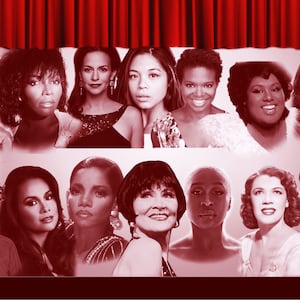Thousands of theater professionals assembled this week for #BwayforBLM, a three-part online forum that was raw, emotionally charged, and bracingly frank about the systemic problems plaguing the medium’s white-dominated spaces and institutions.
The forum took place amid a global uprising over the death of Black Americans at the hands of police, and a reckoning with anti-Black racism across a growing number of industries—including media, retail, and tech.
The event closed out a week that also saw the circulation of an open letter, “We See You, White American Theater,” decrying racist structures and practices across the profession nationally, signed by more than 300 non-white theater artists and accompanied by a petition with more than 60,000 signatures.
But #BwayforBLM offered a unique live forum for Black people in the industry to detail their experiences with racism, calling out the systems that devalue Black bodies and creativity. They did so first among their peers, on a massive Zoom call held Wednesday that organizers say drew around 600 Black participants, from Broadway veterans to theater students.
“It felt so strong, and like we were all together for the first time in a long time,” said performer Amber Iman, a founding member of the Broadway Advocacy Coalition, which organized the forum. The Zoom call was a powerful start, intentionally creating “a safe space for Black voices to be able to come together to speak their minds, and not worry about any consequences or who’s listening or judging,” said Iman, who has worked on Broadway and toured in Hamilton.
Broadway Advocacy Coalition is a grassroots organization that came together in the wake of the 2016 election, with an event, also called #BwayforBLM, in front of an audience of 1,200 at Columbia Law School, featuring performances, panels, and activist talks.
For this second iteration of #BwayforBLM, going online in the midst of the pandemic presented a more dynamic opportunity—to first foster a welcoming space for Black people to share their experiences in the industry with each other, and on days two and three, to invite an online audience, including non-Black allies, to listen and hold themselves accountable.
Nights two and three drew around 5,000 live viewers, more than would fit in four of the largest Broadway theaters. The comments were filled with notes of gratitude and affirmation from actors, directors, designers, and press agents whose names frequent New York’s Playbills. Videos of the livestreams have around 10,000 views each and counting.
“We're granting space and opportunity for our white allies to come and listen, but they wont be able to speak,” Iman said of the planning around day two. “That was very important, because this is about us not centering the narrative around [white people]. We are offering you a seat at our table so that you can listen and process.”
Performer Britton Smith, president of BAC and last on Broadway in Be More Chill, opened day two by acknowledging it would be part of a long, ongoing conversation, and that Black panelists were putting themselves on the line in honor of clarity and honesty.
“We don’t owe you this,” said Smith, speaking specifically to white viewers. “You are blessed to hear from us. We have worked through pain to produce this. We are still hurting. We are still fighting. So I want to sit in gratitude, and give you the chance to do that with us.”
These conversations aren’t new among Black people, in other words, and opening them up to a broader audience was an act of bravery and grace.
Iman spoke on the first panel of young professionals, about her personal experiences with racism (producers sent her to sing in Black churches to promote her first Broadway show; they’d sent mailers but, “Black people don’t read” they said). She emphasized that theater is a top-down system that begins with producers and investors, not casting directors.
Production stage manager Cody Renard Richard, who earlier this week recounted racism he’s faced in a Twitter thread that also landed him on CNN, spoke of how often Black people swallow mistreatment to survive in the business.
The evening’s most emotional moment came from Daniel J. Watts, who was starring on Broadway as Ike Turner in Tina: The Tina Turner Musical before the shutdown. After insisting demands must be for equality, not diversity, he recounted feeling like an afterthought in rehearsal rooms and on stages.
Watts recalled breaking down in the middle of a show over news that Trayvon Martin’s killer, George Zimmerman, would not be indicted, having to immediately go back on stage with white peers, and wondering what value they placed on his own life. (Company management had already told him that posting a Black Lives Matter statement backstage was too much of a “hot button issue.”)
“I’m glad Broadway is shut down,” Watts said. “Because if it were business as usual, none of this energy would be happening,” he said.
Both evenings featured experienced stars and younger professionals, fostering intergenerational conversations and demonstrating that racism doesn’t end when you reach a certain level of success.
“I’ve been fortunate enough to have had opportunities that have created a career for me,” said LaChanze, a Tony winner for The Color Purple. “But I’m still a Black woman. I wouldn’t say that [success] has changed any racist ideologies that I've had to deal with,” she said.
Cynthia Erivo, also a Tony winner and Oscar nominee, stressed that Black people shouldn’t measure themselves by awards or industry attention. “You don’t have to have accolades to know what you’re worth and how valuable you are,” she said.
The third session was billed as a “day of accountability,” in which Black panelists and others outside the industry discussed how to push for real change.
“Accountability is judged by action,” said Broadway regular and touring vocalist Brian Stokes Mitchell. He was joined by fellow Tony winner Audra McDonald, a series regular on The Good Fight, and Adrienne Warren, a founding member of Broadway Advocacy Coalition who was starring opposite Watts as Tina Turner prior to the shut down.
“Now that there’s awareness, we need to galvanize and move forward with accountability and advocacy, McDonald said. “There must be action behind all this conversation.”
Tonya Pinkins, a career actor in theater, TV, and film had the most resounding sermon of the evening. “White people have to get comfortable with being uncomfortable,” she said. “White people cultivate worlds and institutions for their comfort, and they have been weakened by that. When we come to them with all of our strength and our power, they are so uncomfortable that they want to take our oceanic power and brilliance and push it into their thimble.”
She continued, “The majority of people of color on this planet are filled with so much power and energy that when gatekeepers who are dominantly white get out of the way, the whole world is going to benefit from that.”
Susan Sturm, a professor at Columbia Law School and founding director of the Center for Institutional and Social Change, called for theater to lead the way.
“Legal institutions are often part of the problem; the driver of change is not coming from the institutions that bear public responsibility. So we need theaters of change,” she said. “We need to create spaces where people can come together in a different way, make change happen in those spaces, and then bring it back into the legislatures and the courts and boardrooms that have formal responsibility.”
In the same vein, Iman suggested to me the unique power of theater to generate a sort of radical empathy that doesn’t exist elsewhere, but can extend beyond its walls. “We bring strangers together in the dark to have the same experience, to watch the same stories, to laugh together, to cry together. Nothing else does that,” she said. “That’s why theater feels like the smartest place to begin,” building connections and extending kindness that radiates outward. “Wherever we are in our communities, that’s where the change has to start.”
To close, Jeanine Tesori, Tony winning composer of Fun Home, was the first to read a public pledge that the group hopes will be adopted by non-Black theater professionals. It promises accountability, active listening, dismantling learned racism, and continuing to engage in difficult conversations.
“Signing this pledge does not take me off the hook,” it reads. “Hold me accountable.”







